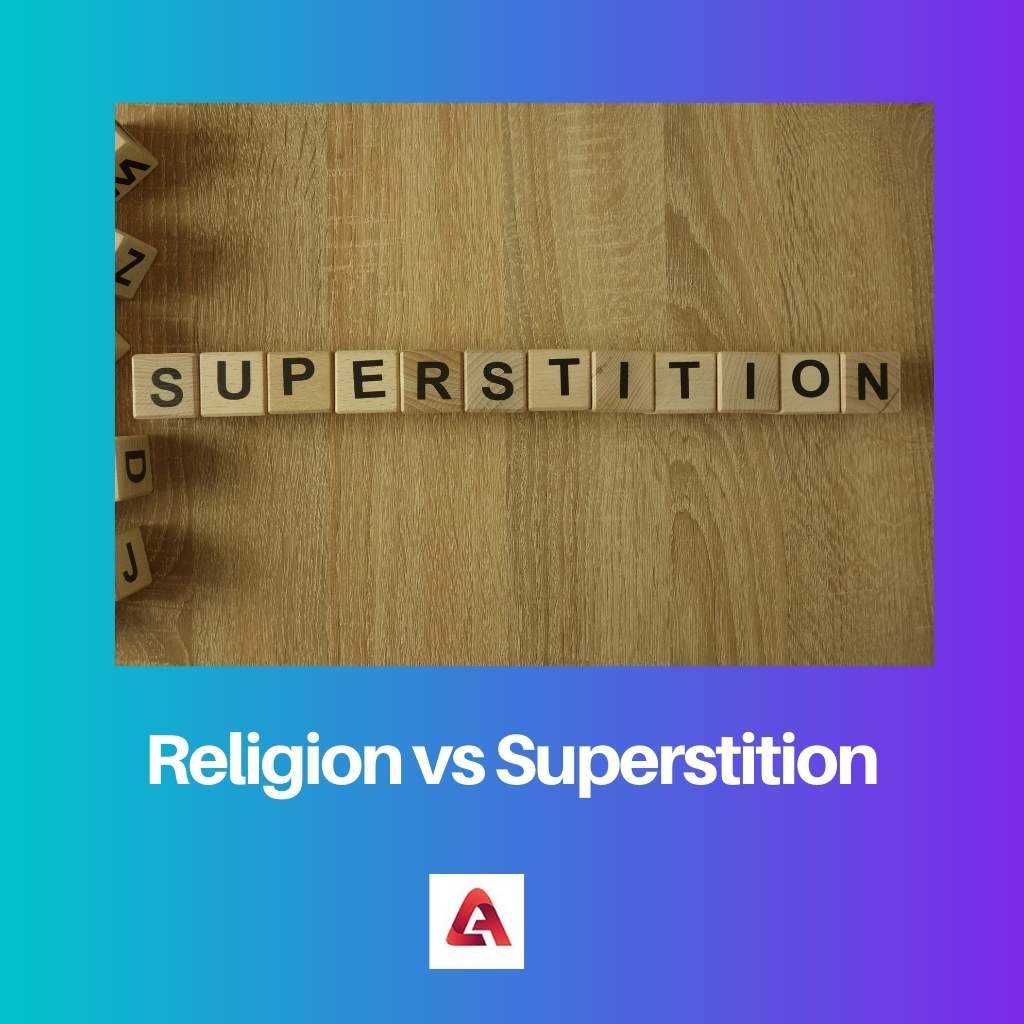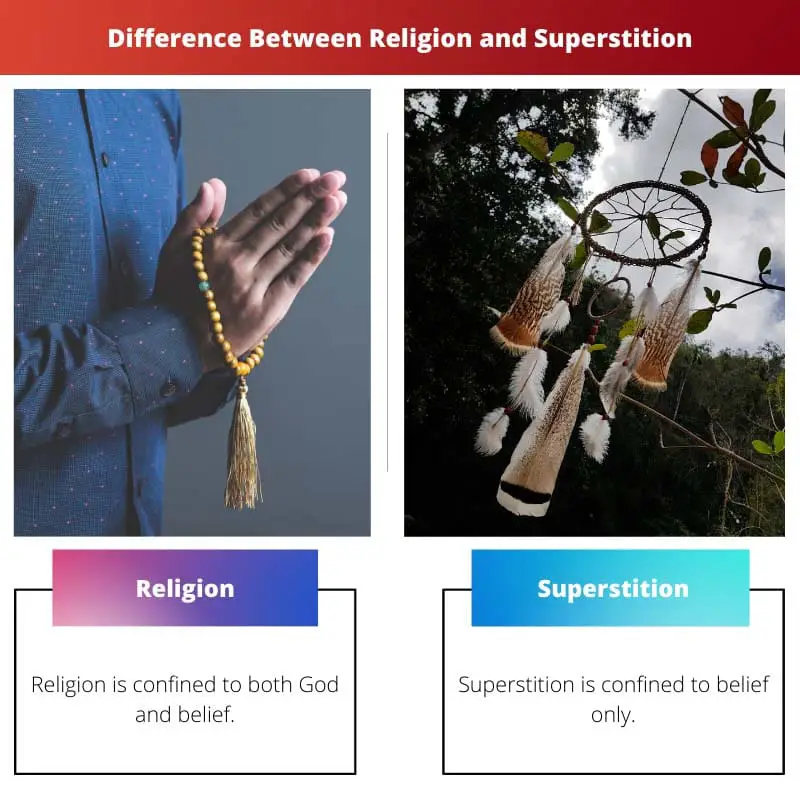Religion and Superstition play a vital role in society across the world. Belief is one thing that forms a bridge between Religion and Superstition. Both Religion and Superstition are connected to every culture. Religion relies on God, whereas Superstition deals with supernatural beliefs.
Key Takeaways
- Religion encompasses structured beliefs, moral values, and practices, while superstition involves irrational beliefs without evidence.
- Most religions have an organized structure, recognized scriptures, and institutions, whereas superstitions lack such formal organization.
- Religion aims to provide guidance and support, while superstition seeks to explain unexplained phenomena through magical thinking.
Religion vs Superstition
The difference between Religion and Superstition is that they differ in the belief of a community. Religion is confined to worshipping Gods and devoting them. Superstition is just a belief that relies on rituals performed over them. Every Religion has its own Superstitious beliefs that may or may not be true.

Religion deals with believing in and worshipping Gods. It follows a system of beliefs that is confined to a group of people or a community that follows a particular Religion.
Each religion has its purpose, apart from its beliefs. Every Religion has a unique ideology that is confined to nature. Though separated by Religion, all are united by their ideologies.
Superstitions are based on practices and supernatural happenings across the world. Superstitions are created by humans and are believed and followed from generation to generation. Though there have been many technological advancements, Superstitions still exist.
Comparison Table
| Parameters of Comparison | Religion | Superstition |
|---|---|---|
| Definition | Religion is defined as belief and worship towards God. | Superstition is defined as supernatural beliefs and practices or rituals that may or may not be true. |
| Belief | Religion is confined to both God and belief. | Superstition is confined to belief only. |
| Purpose | Religion binds society together with a collection of devotional rituals. | Superstition deals with the individual’s beliefs that end up being supernatural. |
| Moral Values | It ensures that its disciples have disciplines bound in it when enhances the moral value of the individuals. | Superstitions do not provide any moral values. |
| Types | There are various religious groups such as Hindu, Muslim, Christian, Jain, Sikh, Buddism, and so on. | Few examples of Superstitious beliefs are horseshoe is nailed so that it is believed that it brings good luck. |
What is Religion?
Religion is formed to create stability and discipline across the community or a group of people. It enhances the social well-being of society. Religion is not just a mere belief but a devotion to God.
It is considered to be very pure. Religion has certain rituals and cultures that are deemed to bring peace to the soul and among society.
There are various religions in today’s world, such as Islam, Buddhism, Christianity, Hinduism, Muslim, Jainism, and so on. Religion is formed to create stability and discipline across the community or a group of people. It enhances the social well-being of society. Religion is not just a mere belief but a devotion to God. Each Religion has its disciples and rituals. It enhances social solidarity through its functions and understandings.
Every Religion has its Religious, and spiritual leader, which may not be present for some religions.
Religion is devotion towards God or Goddess in idol form. It differs from religion to religion, Hindus and Christians worship God in the form of idols, while Muslims worship their epic script called Quran.
Every Religion has its epic scripts, Mahabharat and Ramayan for Hindus, Quran for Muslims, and Bible for Christians.
Religion provides lawful solutions for human conflicts and their ideologies, every problem that arises in the present world has its solutions in the epic scripts confined to Religion.
Though there might be various religions, the ideology of the scripts written is for the well-being of Human Beings and other creatures in the world.

What is Superstition?
Superstition is defined as a belief in supernatural and practice-based events happening. They are created by Humans and practised and followed even today. They are transmitted from generation to generation, and believed in them. Superstitions are a great belief for people during ancient days.
Though there is an advancement in science and technology across the world, still belief in Superstitions exists even today. They are confined to cultures and not to religions to a great extent. Superstitions are mere beliefs that are based on an individual’s mindset.
Superstitions include witchcraft, myths, evil spirits, black magic, white magic, and traditional beliefs. Superstitious beliefs are cultural beliefs that influence people around them. They are also related to luck. Beliefs and Rituals are interlinked with luck and other superstitious beliefs.
Superstition beliefs work for good as well as for bad too. White magic believes in working to cure disease and help for a good cause. In contrast, Black magic is done for bad causes.
Black magic included spells and charms as well. One such superstition belief is that they are difficult to differentiate from cultural beliefs and rituals.

Main Differences Between Religion and Superstition
- Religion is defined as a belief and worship towards God, and it is centred on God. In contrast, Superstition is a mere belief and not confined to worshipping God.
- Religion is created to bind people together under the umbrella of unity and discipline, whereas Superstition is targeted towards a particular goal and to achieve it. It also includes beliefs based on luck.
- Religion has spiritual leaders and ideas that the followers obey to achieve strength physically and mentally, whereas Superstitions have no leaders. They are based on practices, and people excel in it.
- Religions such as Hindu, Muslim, Christian, Buddism, Sikh, and Jainism are prevailing even today, whereas Superstitious beliefs such as witchcraft, white magic, black magic, spells, and charms are rarely existing but still prevail.
- Religion is considered to be very pure in its ideologies and followings, whereas it is not true when it comes to Superstitions.

- https://books.google.com/books?hl=en&lr=&id=OvPpCEwxjxMC&oi=fnd&pg=PA1&dq=religion&ots=J5KwQM-tPL&sig=ZFaVs8r-o710gCdxpwO35CcO6kE
- https://psycnet.apa.org/record/1987-98795-000

The article’s explanation of the purpose and moral values associated with religion and superstition is enlightening. It emphasizes how religion seeks to provide guidance and support through devotional rituals, whereas superstition revolves around individual beliefs that are supernatural.
I agree, the article effectively delves into the moral and purpose-driven aspects of both religion and superstition, highlighting their significance within society.
The article’s detailed explanation of religion and superstition effectively differentiates between belief structures and cultural influence. It provides an insightful comparison that enhances understanding of these fundamental concepts.
Absolutely, the article’s detailed comparison offers valuable insights into the nuanced distinctions between religious beliefs and superstitious practices.
The article effectively outlines the key differences between religion and superstition, shedding light on how religion aims to bind society with devotional rituals and moral values, while superstition relies on individual beliefs without structured moral guidance.
I completely agree. The article presents a comprehensive analysis of the distinctions between religion and superstition, offering valuable insights into their societal implications.
The detailed comparison between religion and superstition provides a deeper understanding of their respective roles within cultural and societal frameworks. It’s an enlightening read.
The article effectively encapsulates the purpose and significance of religion and superstition, highlighting how religion aims to provide lawful solutions and moral values, whereas superstition remains rooted in individual beliefs without structured guidance.
Absolutely, the article’s in-depth comparison offers valuable insights into the complexities of religious beliefs and superstitious practices.
The article does a great job in highlighting the differences between religion and superstition. It’s important to note that while both involve belief and practices, religion has a more structured and moral approach, whereas superstition tends to be more irrational.
I appreciate the clear comparison between religion and superstition. It helps to differentiate the two and understand their significance in cultural and social contexts.
I completely agree. It’s interesting to see how both play a vital role in society but with distinct characteristics and purposes.
The comparison table is quite informative, it clearly outlines the differences between religion and superstition based on belief, purpose, moral values, and types. This helps in understanding the nuances of both concepts.
I found the comparison table to be very helpful as well, especially for those who want a quick overview of the differences between religion and superstition.
Indeed, the article provides a well-structured comparison that aids in understanding the complexities of religion and superstition in different cultural contexts.
The article’s distinction between religion and superstition helps in understanding the fundamental disparities between structured beliefs and irrational practices. It provides a valuable overview of their roles within societies.
I agree, the article’s detailed analysis of religion and superstition benefits readers by offering a clear understanding of their cultural and societal influences.
The concept of religion and superstition is blurred by many, and this article does a great job clarifying the distinctions between the two. Religion seems to be a more organized and institutional belief system, while superstition is more based on individual beliefs without much formal structure.
Absolutely, the article provides a comprehensive comparison and sheds light on the significance of religious beliefs and superstitious practices in various cultures.
The article provides a well-rounded comparison between religion and superstition, highlighting their fundamental differences in belief, purpose, and cultural influence. It’s an informative read for those interested in understanding the intricacies of religious and superstitious beliefs.
The detailed description of how religion provides stability, discipline, and social well-being, contrasts with superstition’s reliance on individual beliefs and cultural influence. This differentiation helps in understanding their respective roles in societal contexts.
I appreciate the article’s focus on the distinct types of beliefs and practices associated with religion and superstition, which helps in clarifying their roles within cultural and societal frameworks.
Absolutely, the article offers a nuanced perspective on religion and superstition, emphasizing their roles in shaping social constructs and belief structures.